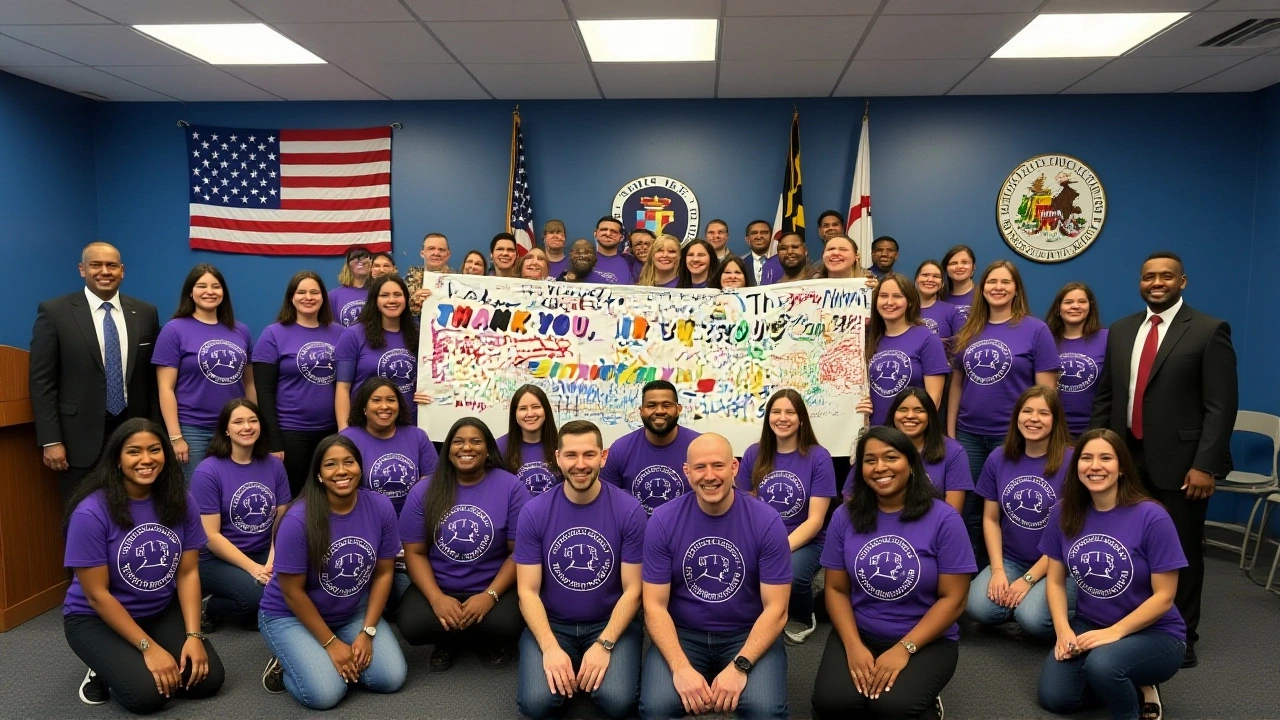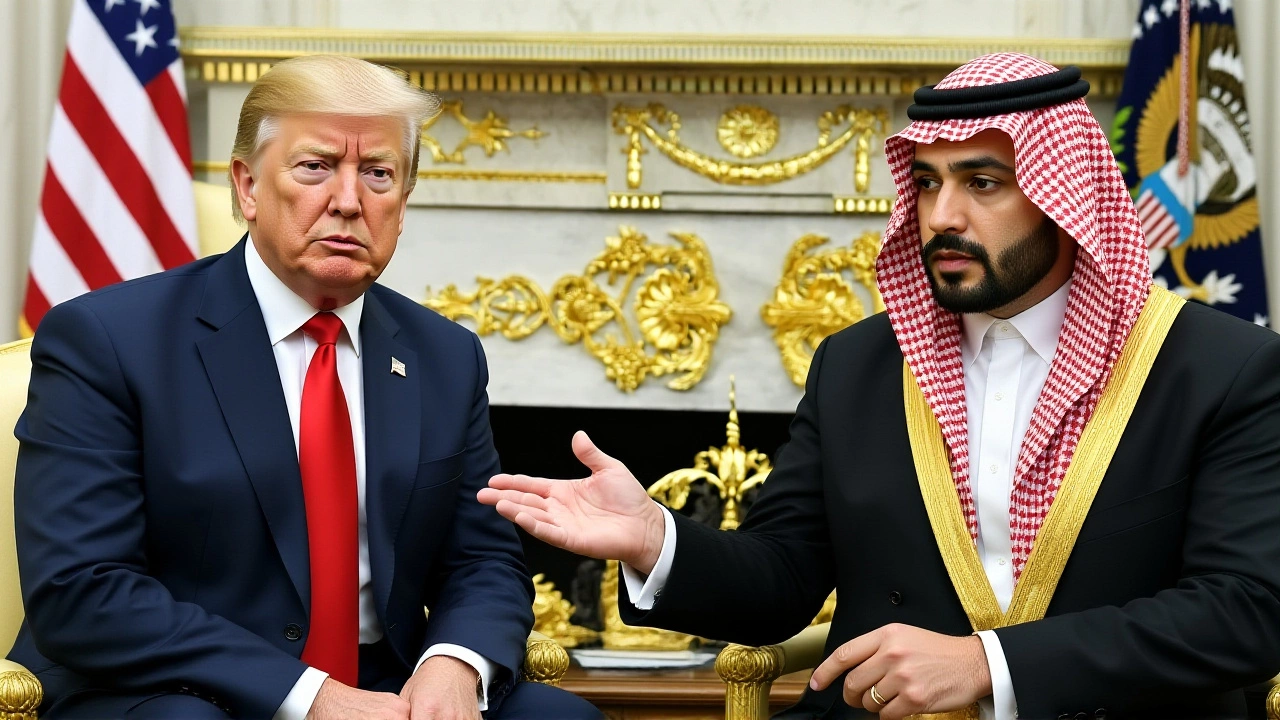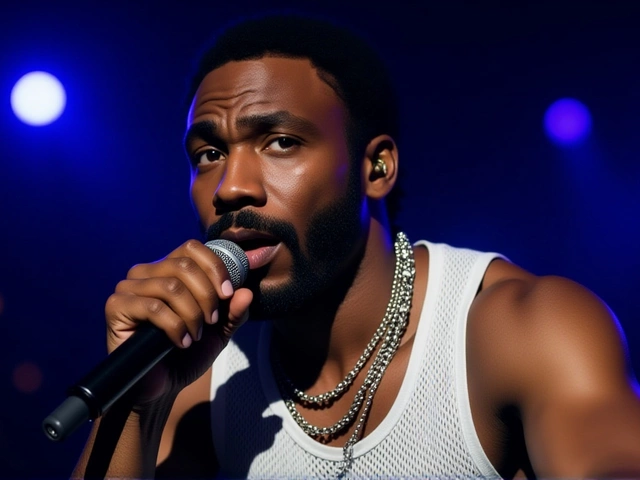When Donald Trump welcomed Crown Prince Mohammed bin Salman to the White House for a black-tie dinner on November 18, 2025, the East Room shimmered with chandeliers — and controversy. The Saudi leader, who also serves as Prime Minister of the Kingdom of Saudi Arabia, arrived after a day of high-stakes talks on defense, AI, and nuclear cooperation. But beneath the formalities, the air was thick with unspoken history: the 2018 murder of Jamal Khashoggi, the 345 executions Saudi Arabia carried out last year — a record — and the lingering shadow of 9/11 allegations tied to the kingdom. Trump didn’t flinch. "I'm very proud of the job he's done," he told ABC News reporter Mary Bruce. "What he's done is incredible in terms of human rights and everything else." Here's the thing: that statement landed like a stone in still water. Because the numbers don’t lie. In 2024, Saudi Arabia executed more people than any year since modern record-keeping began. The World Socialist Web Site called it a "state-sanctioned bloodbath." And yet, here was Trump, standing shoulder-to-shoulder with the man accused of authorizing Khashoggi’s dismemberment inside the Istanbul consulate — a killing that even the CIA concluded was ordered by bin Salman himself.
The Dinner and the Diplomacy
The formal event, broadcast live by PBS NewsHour, was a carefully choreographed spectacle. The First Lady, Melania Trump, greeted the Crown Prince with a polite smile. Behind them, Republican senators, tech billionaires, and defense contractors mingled under crystal chandeliers. The White House dinnerWhite House was not just a meal — it was a signal. A message to the world: business as usual, no matter the cost. Discussions that day focused on five key areas: defense contracts worth billions, joint AI research initiatives, potential U.S. nuclear technology transfers, expanded trade pacts, and — most explosively — the prospect of Saudi-Israeli normalization. The latter, a long-standing U.S. foreign policy goal, could reshape the Middle East. But critics point out: why now? Why reward a regime that silences dissent with prison, lashes, and death?Trump’s Family and the Financial Ties
Then there’s the money. Donald Trump Jr. was in the room, not as a guest, but as a dealmaker. Hours before the dinner, he signed agreements to build three Trump-branded luxury towers in Jeddah and Riyadh — the largest venture ever by the Trump Organization in the kingdom. The contracts, worth an estimated $1.2 billion, come just months after Saudi sovereign wealth funds invested over $2 billion into Kushner Companies — the firm run by Trump’s son-in-law, Jared Kushner. Kushner, notably, did not attend the dinner. But Trump dismissed questions about conflicts of interest with a wave of his hand. "I have nothing to do with the company," he insisted, even as he remains its legal owner. It’s a paradox that defines his presidency: the man who promised to drain the swamp, now swimming in its deepest waters.Human Rights and the Silence of the World
The World Socialist Web Site didn’t mince words. In a scathing analysis, it called the event a "meeting of two billionaire rulers perched atop political powder kegs," each presiding over systems built on repression. The article noted that while Western media often frames Saudi Arabia as a strategic ally, the reality is far darker. Over 10,000 political prisoners languish in Saudi dungeons. Women’s rights activists who campaigned for the right to drive were jailed and tortured. And Khashoggi’s murder? It wasn’t an anomaly — it was policy. Yet, the U.S. State Department issued no statement condemning the executions. No senator demanded a pause. No major news outlet challenged Trump’s claim that bin Salman had made "incredible" progress on human rights. The silence speaks louder than any protest.
What’s Next? The Unspoken Agenda
The Crown Prince departed the South Lawn of the White House on November 18, 2025, after a farewell ceremony that felt more like a coronation than a diplomatic send-off. But the real work is just beginning. U.S. defense firms are already preparing to deliver advanced missile systems to Riyadh. Talks on nuclear energy cooperation are moving forward, despite Saudi Arabia’s refusal to sign the Non-Proliferation Treaty’s additional protocol. And the normalization talks with Israel? They’re not just about peace — they’re about control. A Saudi-Israeli alliance, brokered by Washington, could cement authoritarian stability across the region — at the cost of democracy, dissent, and dignity. Meanwhile, the families of Khashoggi’s victims wait. Human rights groups are filing lawsuits in U.S. courts, hoping to use the Foreign Sovereign Immunities Act to hold the kingdom accountable. But with Trump in the White House, those cases face an uphill battle.The Legacy of a Night in the East Room
History won’t remember this dinner for its caviar or champagne. It’ll remember it for what it revealed: that power, when unchallenged, doesn’t just ignore morality — it redefines it. Trump didn’t just host a foreign leader. He legitimized a regime built on blood. And in doing so, he sent a message to autocrats everywhere: if you have oil, weapons, and enough money, the White House will open its doors — no questions asked.Frequently Asked Questions
Why did Trump defend Mohammed bin Salman’s human rights record despite the 345 executions?
Trump’s defense reflects a long-standing U.S. foreign policy prioritizing strategic alliances over human rights. Saudi Arabia is the world’s largest oil exporter and a major buyer of U.S. weapons — over $110 billion in arms sales since 2017. Trump has repeatedly framed these economic and security ties as more important than criticism of domestic repression, even when evidence of atrocities is overwhelming.
What role did Donald Trump Jr. play in the visit?
Donald Trump Jr. signed binding agreements for Trump-branded luxury developments in Jeddah and Riyadh, marking the Trump Organization’s largest-ever project in Saudi Arabia. The deals, worth approximately $1.2 billion, were finalized hours before the White House dinner, raising clear ethical concerns about the intersection of presidential diplomacy and private business interests.
How has the U.S. government responded to Saudi Arabia’s record of executions?
The U.S. State Department has issued no official condemnation of Saudi Arabia’s 2024 execution tally — the highest in modern history. While the Biden administration paused some arms sales in 2021, the Trump administration not only resumed them but expanded them. No sanctions have been imposed, and no high-level officials have publicly questioned the kingdom’s use of capital punishment, even for nonviolent offenses.
What are the implications of U.S.-Saudi nuclear cooperation?
Discussions about transferring U.S. nuclear technology to Saudi Arabia raise serious proliferation concerns. Unlike Iran, Saudi Arabia has not signed the IAEA’s Additional Protocol, which allows for intrusive inspections. If the U.S. provides enrichment or reprocessing technology, it could enable Riyadh to develop nuclear weapons under the guise of civilian energy — a scenario that could trigger a regional arms race with Iran and Israel.
Why didn’t Jared Kushner attend the dinner?
Kushner, who received $2 billion in investments from Saudi sovereign wealth funds, reportedly avoided the event to reduce scrutiny over potential conflicts of interest. His firm, Kushner Companies, remains deeply entangled with Saudi capital, even as Trump publicly claims no involvement with the Trump Organization — a legal fiction critics say obscures the real financial ties between the presidency and foreign autocrats.
Is there any legal recourse for victims of Saudi human rights abuses?
Yes — families of Khashoggi and other victims have filed lawsuits in U.S. federal courts under the Alien Tort Statute and the Torture Victim Protection Act. But success is unlikely under Trump’s administration, which has consistently blocked judicial efforts to hold foreign governments accountable. The State Department has also invoked the "political question doctrine" to dismiss such cases, effectively shielding Saudi officials from U.S. justice.



